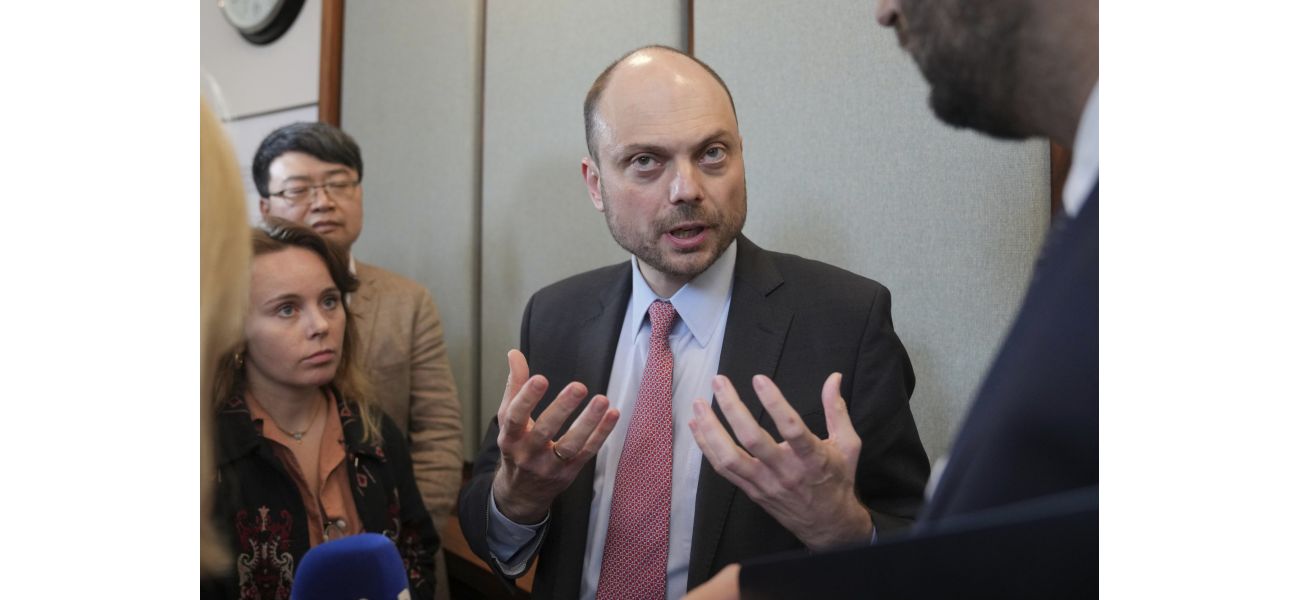Former gulag survivor shares one haunting memory that continues to haunt him, despite his survival and criticism of Putin.
February 15th 2025.

Vladimir Kara-Murza, a prominent Russian opposition politician, sat in the lobby of a central London hotel, feeling brave and determined. It had been six months since his release from the IK-6 colony in Omsk, Siberia, a maximum security prison located 2,800 miles away. He had spent two-and-a-half years there, enduring unimaginable hardships and mistreatment, as confirmed by Amnesty International. He was even placed in solitary confinement multiple times, a form of punishment known as "SHIZO."
What had led to his imprisonment was his vocal opposition against the full-scale invasion of Ukraine, a decision that had not sat well with the authorities. But last August, in a historic exchange of prisoners, Kara-Murza was finally free. He was now one of the few remaining faces of Russia's beleaguered opposition, and he sat down with Metro for an exclusive interview to share his experiences and thoughts on his newfound freedom.
As a British citizen, Kara-Murza was now working with the administration of US President Donald Trump to secure the release of prisoners of war, civilian hostages, and other Russian political prisoners. It was rumored that this could be part of a ceasefire to end the bloody three-year conflict initiated by Russian leader Vladimir Putin. Since his release, Kara-Murza had been tirelessly campaigning for tougher sanctions against the Kremlin, spending most of his days on the move rather than in the confines of a prison cell.
Reflecting on his time in prison, Kara-Murza admitted that he was slowly starting to forget the horrors he had experienced. However, there was one thing that he could not erase from his memory. He explained that the human mind often tries to block out traumatic experiences, but there was one thing he would never be able to forget. Authorities in Russia have a long history of punishing political opponents by targeting their families, and Kara-Murza's wife and children had also faced their share of suffering.
During his two-and-a-half-year imprisonment, Kara-Murza was only allowed to speak to his wife and children once on the phone. His wife had to time the calls carefully to ensure that each child received an equal amount of time to speak with their father. It was a form of torture not only for the prisoners but also for their families. Before his imprisonment, Kara-Murza had already survived two assassination attempts by the Putin regime, leaving him with a life-threatening nerve disorder. Sadly, many of his fellow activists did not survive, including his mentor and godfather to his youngest daughter, Boris Nemtsov, who was fatally shot in 2015.
Conditions in Russian prisons vary greatly, and Kara-Murza's time in confinement was no exception. He described the isolation and lack of human interaction as the most difficult part. As human beings, we need social interaction, and being deprived of it for days and weeks on end can lead to severe mental and emotional distress. Kara-Murza also shared that he found solace in learning Spanish and receiving thousands of letters from supporters all over Russia, proving that not everyone in his home country supports Putin's actions in Ukraine.
He emphasized the importance of writing to political prisoners, as even a simple letter can make a significant difference in their mental and emotional well-being. For Kara-Murza, those letters were a source of hope, warmth, and light in the darkness of his prison cell. As he continues to share his story with the world, he hopes to inspire others to take action and stand up against injustice.
What had led to his imprisonment was his vocal opposition against the full-scale invasion of Ukraine, a decision that had not sat well with the authorities. But last August, in a historic exchange of prisoners, Kara-Murza was finally free. He was now one of the few remaining faces of Russia's beleaguered opposition, and he sat down with Metro for an exclusive interview to share his experiences and thoughts on his newfound freedom.
As a British citizen, Kara-Murza was now working with the administration of US President Donald Trump to secure the release of prisoners of war, civilian hostages, and other Russian political prisoners. It was rumored that this could be part of a ceasefire to end the bloody three-year conflict initiated by Russian leader Vladimir Putin. Since his release, Kara-Murza had been tirelessly campaigning for tougher sanctions against the Kremlin, spending most of his days on the move rather than in the confines of a prison cell.
Reflecting on his time in prison, Kara-Murza admitted that he was slowly starting to forget the horrors he had experienced. However, there was one thing that he could not erase from his memory. He explained that the human mind often tries to block out traumatic experiences, but there was one thing he would never be able to forget. Authorities in Russia have a long history of punishing political opponents by targeting their families, and Kara-Murza's wife and children had also faced their share of suffering.
During his two-and-a-half-year imprisonment, Kara-Murza was only allowed to speak to his wife and children once on the phone. His wife had to time the calls carefully to ensure that each child received an equal amount of time to speak with their father. It was a form of torture not only for the prisoners but also for their families. Before his imprisonment, Kara-Murza had already survived two assassination attempts by the Putin regime, leaving him with a life-threatening nerve disorder. Sadly, many of his fellow activists did not survive, including his mentor and godfather to his youngest daughter, Boris Nemtsov, who was fatally shot in 2015.
Conditions in Russian prisons vary greatly, and Kara-Murza's time in confinement was no exception. He described the isolation and lack of human interaction as the most difficult part. As human beings, we need social interaction, and being deprived of it for days and weeks on end can lead to severe mental and emotional distress. Kara-Murza also shared that he found solace in learning Spanish and receiving thousands of letters from supporters all over Russia, proving that not everyone in his home country supports Putin's actions in Ukraine.
He emphasized the importance of writing to political prisoners, as even a simple letter can make a significant difference in their mental and emotional well-being. For Kara-Murza, those letters were a source of hope, warmth, and light in the darkness of his prison cell. As he continues to share his story with the world, he hopes to inspire others to take action and stand up against injustice.
[This article has been trending online recently and has been generated with AI. Your feed is customized.]
[Generative AI is experimental.]
0
0
Submit Comment





